Suchergebnisse für "Factsheet: Energietechnologien gestalten, die für alle sinnvoll und nutzbar sind"
Technischer Status von Wohnraumlüftungen
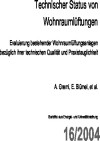
Schriftenreihe
16/2004
A. Greml
Deutsch, 298 Seiten
Downloads zur Publikation
Wandsysteme aus Nachwachsenden Rohstoffen

Schriftenreihe
31/2001
R. Wimmer, H. Hohensinner, L. Janisch, et.al.
Deutsch, 99 Seiten
Downloads zur Publikation
SIP- Siedlungsmodelle in Passivhausqualität
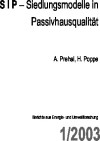
Schriftenreihe
01/2003
A. Prehal, H. Poppe
Deutsch, 274 Seiten
Downloads zur Publikation
Windenergienutzung in Schigebieten daWindSchi
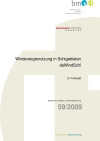
Schriftenreihe
59/2009
O. Frühwald
Herausgeber: BMVIT
Deutsch, 59 Seiten
Downloads zur Publikation
Tagungsband des Startworkshops
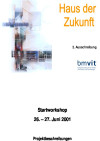
Herausgeber: BMVIT
Deutsch, 20 Seiten
Downloads zur Publikation
Tagungsband des Startworkshops
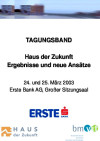
Herausgeber: BMVIT
Deutsch, 102 Seiten
Downloads zur Publikation
WOP - Wohnbausanierung mit Passivhaustechnologie
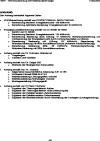
Schriftenreihe
39/2006
A. Prehal, H. Poppe
Deutsch, 132 Seiten
Downloads zur Publikation
Windintegration unterstützt duch Lastmanagement
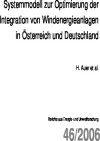
Schriftenreihe
46/2006
H. Auer
Deutsch, 164 Seiten
Downloads zur Publikation
Technologieplattform Photovoltaik Österreich
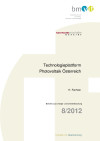
Schriftenreihe
08/2012
H. Fechner
Herausgeber: BMVIT
Deutsch, 52 Seiten
Downloads zur Publikation
Integral Resource Optimization
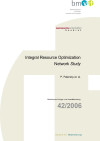
Schriftenreihe
42/2006
P.Palensky
Deutsch, 121 Seiten
Downloads zur Publikation
Neubau ökologisches Gemeindezentrum Ludesch
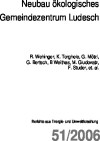
Schriftenreihe
51/2006
R. Wehinger, K. Torghele, G. Mötzl, G. Bertsch, B Weithas, M. Gludovatz, F. Studer, et. al.
Deutsch, 146 Seiten
Downloads zur Publikation
Akzeptanzverbesserung von Niedrigenergiehaus-Komponenten
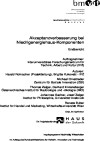
Schriftenreihe
26/2001
H. Rohracher, B. Kukovetz, M. Ornetzeder, et.al.
Deutsch, 336 Seiten
Downloads zur Publikation
Informationsfolder Impulsprogramm Nachhaltig Wirtschaften

Herausgeber: BMVIT
Deutsch
Passivhaustauglicher Scheitholzofen kleiner Leistung
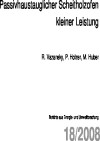
Schriftenreihe
18/2008
R. Vazansky, P. Holzer, M. Huber
Herausgeber: BMVIT
Deutsch, 54 Seiten
Downloads zur Publikation
BIGMODERN - Subproject 5: Feasibility studies about innovative technical solutions
The application of innovative technologies means additional planning and coordination effort which usually cannot be incorporated into the conventional planning processes of the BIG. To overcome these barriers for the application of innovative technologies, the sub project at hand aims at preparing information, feasibility studies, planning records, experiences and practical examples in a way, that they can be implemented directly into the planning process.
BIGMODERN - Subproject 2: Demonstration project of an official building in Bruck
In the frame of this subproject being part of the flagship project BIGMODERN, a decision matrix as well as a handbook for planning, including feasibility analysis and a collection of information, serving as decision guidance for planning and implementation of sustainable building refurbishment, is being developed. In this way, the risk for planners and builders of the usage of new sustainable technologies shall be minimised.
Development of a method and an innovative machine for the industrial application of environmentally friendly, mineral oil free lubricants in deep drawing processes
Eliminating the usage of mineral oil based lubricants in deep drawing processes by an innovative machine for clean application of environmentally friendly wax-based forming emulsions.
Valuation models for future energy clusters considering market, technology and policy uncertainty - Case Study Biomass
Market liberalization, technological change and increasing complexity of international policy processes (e .g. climate negotiations) necessitate new approaches to evaluating investments in an uncertainty and risk-augmented framework. This project developed valuation methods from financial theory - such as real options valuation and portfolio optimization - to quantify the relative competitiveness of bioenergy chains and total energy systems.
ThermoCluster - Heat generation from infrastructure projects and integration into decentralised low-temperature heating and cooling networks for plus-energy districts
Integrative assessment of the geothermal potential of the Brenner base tunnel and the northern portal area, and the subsequent distribution of the heat generated from these sources to the end-consumer in potential plus-energy districts of the city of Innsbruck.
Sanierung PRO!

The goal of the project is the development of a guideline, which supports builders and planners or consultants in the organization and monitoring of inhabitant integration into the reorganization processes of multi-storey housing.
